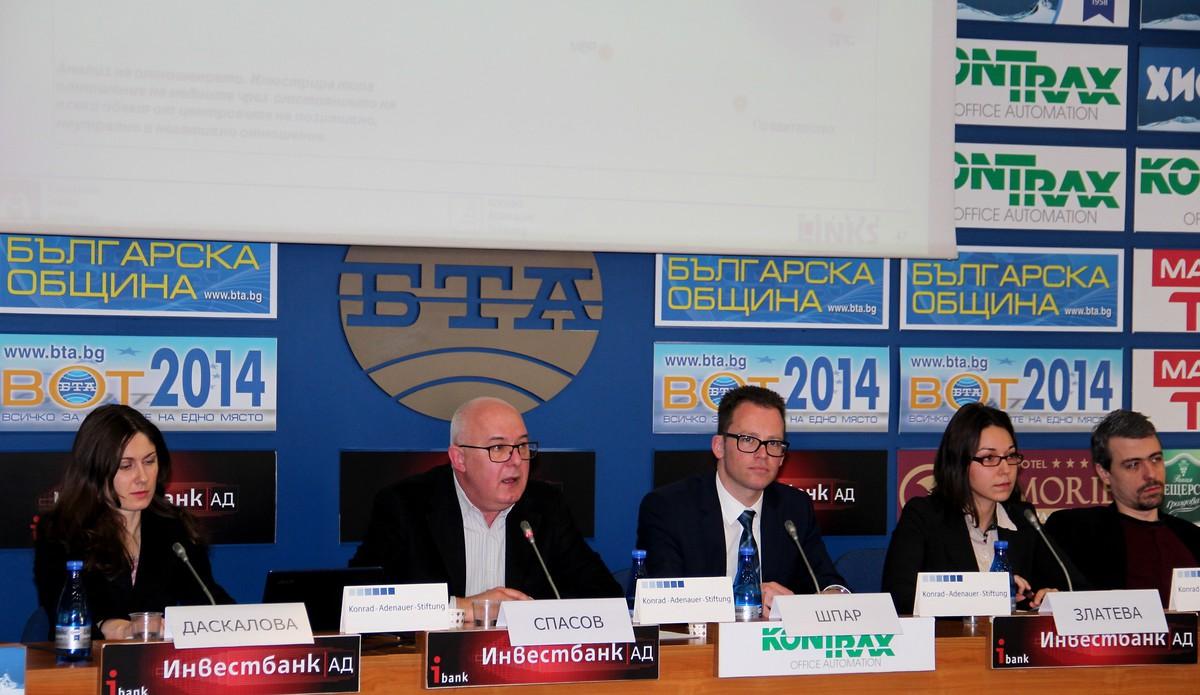Crisis of confidence in Bulgarian media continues - Media Programme Southeast Europe
Event Reports
The Media Program of the Konrad-Adenauer-Stiftung (KAS) and the Foundation Media Democracy presented their annual report 2014 on Bulgarian Media at a press conference on 3 February in Sofia. They introduced also an opinion poll on trust of Bulgarians in the media. The representative survey among 1.100 Bulgarians revealed that only every sixth Bulgarian (17 percent) believes in the independence of media in the country. The study was conducted for the second time by the Bulgarian agency "Market Links" on behalf of the Konrad-Adenauer-Stiftung. Comparing the results with the last year’s monitoring, the Bulgarian media landscape doesn’t make significant progress, said Christian Spahr, Head of the Media Program South East Europe of the Konrad-Adenauer-Stiftung, at the press conference in Sofia. "Still, very few Bulgarians believe in real freedom of media", he added.
According to the opinion poll, 59 percent of the Bulgarians disagree that media are free in their country. Many remain indecisive and only 17 percent explicitly believe in free media reporting. "The lack of trust continues," explained Spahr. "As another research in 2014 showed, at least every second journalist complains about pressure from politics, the own sector or other economic stakeholders." In a worldwide context, Bulgaria’s press freedom is currently ranked 100th (Reporters Without Borders). The Konrad-Adenauer-Stiftung has already published a detailed study concerning the pressure on journalists in Bulgaria in November 2014.
Television is far more popular than online media
Manuela Zlateva, communications expert at the KAS Media Program South East Europe, presented the results of the opinion poll in detail. Television is considered to be the most objective medium and the most popular source for political news for the majority of the Bulgarians. Online media rank second, followed by newspapers, radio podcasts and magazines. Furthermore, regarding the confidence in media, the survey reveals differences according to the age of citizens.
The citizens feel insufficiently informed not only by the media, but also by the political elites. 63 percent evaluate the public relations work of the politicians as poor or very poor. "Parties and government need to invest more in a modern and transparent information policy," concluded Spahr. The Media Program South East Europe of Konrad-Adenauer-Stiftung will extend its activities for communication experts from politics. The institute "Market Links" interviewed 1,100 Bulgarians for the survey (December 2014).
Borissov is mostly named in Bulgarian media
According to an annual media monitoring of KAS and FMD, Prime Minister Boyko Borissov is the most frequently mentioned personality in the political news. Borissov is named 3,908 times in eight leading media outlets during 2014. This is 80 percent more often than the second most frequently mentioned person, President Rossen Plevneliev. Both politicians were increasingly positive described. According to the analysts of FMD this correlates with the election victory of Borissov in October 2014. Among the political parties, Borissov’s conservative party GERB ("Citizens for European Development of Bulgaria") is most frequently mentioned.
"Positive to emphasize is that the public broadcaster BNT remains critical to the three big parties and that it fulfills its role of a public watchdog in interest of all citizens," says the head of FMD Orlin Spassov. "However, it is also true that the necessary changes in the media landscape did not happen in 2014. Journalists still depend too much on external influences from economics, politics and administration." According to FMD and KAS, especially the media ownership is lacking transparency. Besides that, the self-regulation in the sector is not effective enough. Moreover, heavy economic losses of the media significantly affect the quality of the media outlets.
Reforms of the media system are necessary
However, Spassov and Spahr welcome announcements of the Bulgarian government to improve the media legislation in the current election period. Accordingly, only media companies which respect minimum ethical standards will be allowed to participate in public tendering such as public information campaigns. Furthermore, the government would not give public funds to media whose ownership remains unclear, and it will deal more effectively with the issue about the monopolies in the sector. "Although not many details have been presented yet, the government’s suggestions will hopefully lead in the right direction," explains FMD media expert Orlin Spassov. "It is important to involve all relevant stakeholders in the debate: politicians, media owners and journalists. All three groups suffer from the lack of trust in media," says Christian Spahr.
The research institute Market Links analysed more than 21.000 news of four daily newspapers (Trud, Telegraf, Sega, Presa) and four television channels (BNT, bTV, Nova TV, TV 7).
The press conference generated great media interest among Bulgarian journalists. Radio and TV journalists from Germany also visited the event.
The opinion poll as well as the media monitoring are available online.





